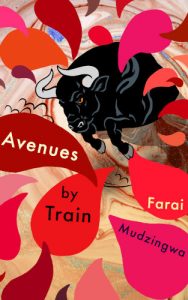The JRB presents an excerpt from Farai Mudzingwa’s debut novel, Avenues by Train.

Avenues by Train
Farai Mudzingwa
Cassava Republic Press, 2023
1
1974
Listen, when the ancestors bite your ears. Natsai and her friends raced across the foot bridge on their way from the early morning Roman Catholic Church mass and teased whoever came last.
‘Whoever is left behind is left behind,’ the same voice blurts out again.
‘Onyo marks!’
‘Seti, seti …’
‘Go!’
Theresa was the slowest kid. She wheezed all the way down the foot path. Their little heads disappeared into the reeds along the stream and only their shrieks and squeals sounded until they popped up on the home side.
On this April school holiday Sunday, on which they stopped by the shops on their way back from church and each bought a loaf of white bread for morning tea, six kids emerged panting and giggling on the other side of the stream. Theresa did not.
She dances,
Come see,
In her watery den,
She dances …
As the kids reported the incident to their parents, Natsai rubbed her ankle where the njuzu had grasped at her, before she had slipped through and it had reached for Theresa instead.
A watery viscous hand slides up out of the water and webbed fingers run up her foot. The prehensile grip around her ankle tightens.
Fingers so cold they register as a burning sensation. A jolt, an electric shock of feeling, shoots up her leg.
The elders sighed and word spread from mouth to ear around Miner’s Drift, that another one had been taken.1
After this taking, as with the others before it, parents forbade their children from walking across the wetland or wandering near the stream and the deep pool near the narrow footbridge. ‘Take the longer route over the vehicle bridge,’ they cautioned. ‘That family, those ones, they don’t pray properly; that’s why these things happen to them,’ said others.
Theresa’s family gathered and performed a bira renjuzu at the pool to appease the water being. During the bira, the spirit of the taken child whispered from the watery depths, and through vigorous dance, the family elders learned what they needed to sacrifice before the njuzu would release the child. It took the better part of a week to source a goat, and in more costly fashion, the requisite mature black bull. ‘She is of VaDziva,’ they chanted in unison to the water entity. ‘Weare kin,’ they pled, while clapping in sombre rhythm. Not a single tear was shed, for shedding tears would seal her fate.
And so it was, that after days of carrying out these and other rituals, she was returned to the surface unharmed, poised for life as a healer.
As the gathered petitioners wipe the water from their eyes and wring out their garments, they catch sight of a little girl crawling up the bank on her hands and knees. She has emerged at the edge of the pool, water streaming and dripping from her, her thin dress clinging to her drenched body. The child is gasping as she tries to adjust to breathing the thin air above the surface.
Theresa’s mother rushes to embrace her. The faraway gaze in the child’s unblinking eyes does not alter.
Back home, Natsai sat rubbing her ankle, ‘Mai, they are saying that if it touches you then you are now a bad person.’
‘Those are witchcraft things my child. Let them touch each other there where they do those things at night.’
‘Asi Mai …’
‘Ah you Natsai, what is it with you today?’
Natsai started to raise her foot up to show her mother the mark on her ankle. ‘The thing, it was crying. I think it was trying to say something.’
‘Do not talk about those heathen things in this house, do you hear me Natsai? We pray in this house. People who believe in those njuzu things do the works of darkness. If you were another person you would bring me my rosary so we can pray right now.’
~~~
1. Miner’s Drift was named after Henry Miner, the biggest and worst poacher in all history. Killed 1 200 elephants ‘on horseback’. Died instantly when a rhino he was trying to shoot sat on his face.
~~~
- Farai Mudzingwa is a Zimbabwean writer whose fiction is influenced by music, our interior selves and alternate realities. He has previously published a short fiction—Green Shadows in the Kiya Kiya Republic—and short stories in Weaver Press anthologies, Kwani?, Writivism, Storymoja and Short Story Day Africa. His writing has appeared in New Frame, Chimurenga Chronic, The Africa Report, New Humanitarian, TRT News, Contemporary& and Mail & Guardian.
~~~
Publisher information
When seven-year-old Jedza witnesses a tragic incident involving a train and the death of his close boyhood friend in his hometown Miner’s Drift, he is convinced that his life is haunted.
Now in his mid-twenties, Jedza is a down-and-out electrician, moving to Harare in the hopes that he will escape the darkness and superstitions of the small town.
But living in the shadowy restless atmosphere of the Avenues with its mysterious pools of water rising under musasa trees, he is tormented by the disappearance of his sister and their early encounters with ancestral spirits, the shapeshifting power of the njuzu and a vengeful ngozi.
To move forward, he must stop running away and confront the trauma of his past.
An eclectic, experimental novel, Avenues by Train is a brash and confident debut by an exciting new voice





